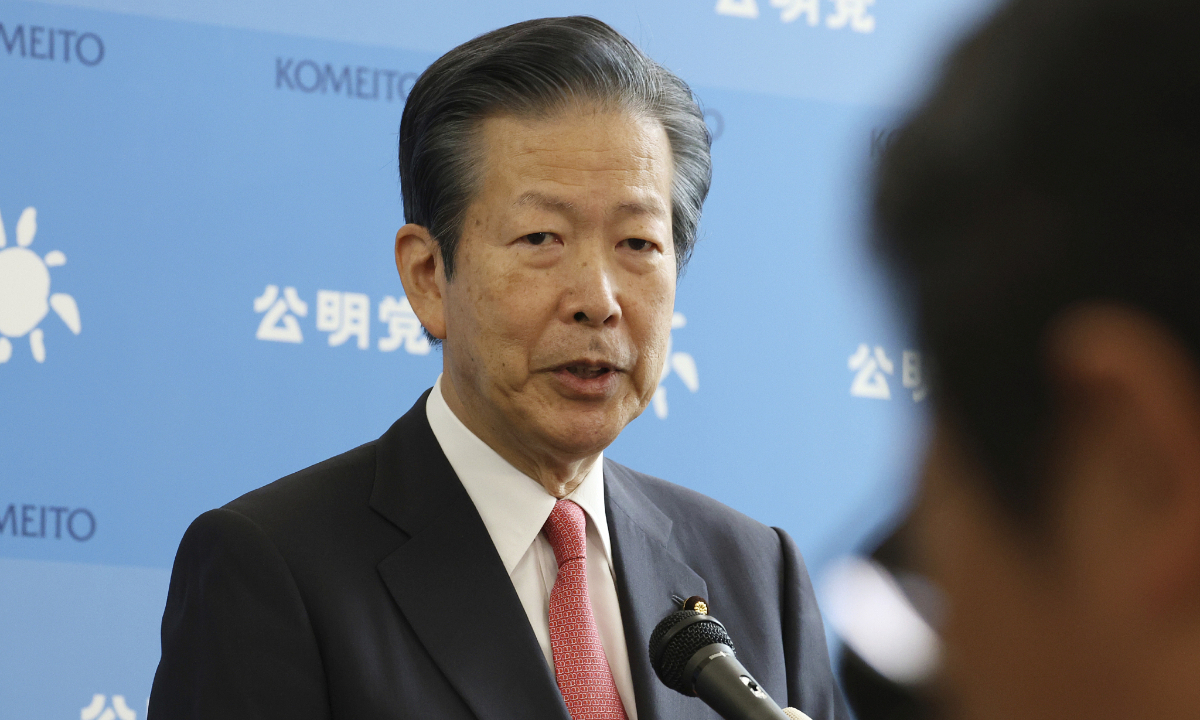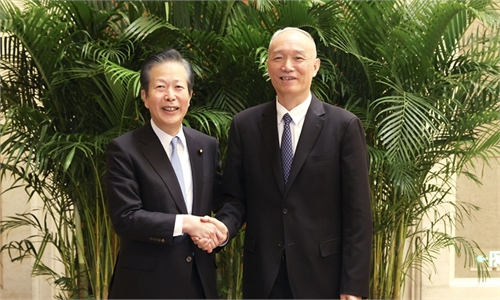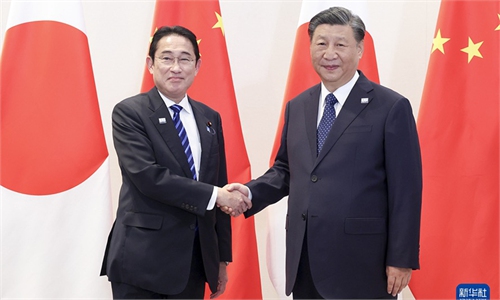
Natsuo Yamaguchi attends a press conference in Tokyo on October 10, 2023. Photo: VCG
The leader of the Komeito Party in Japan, Natsuo Yamaguchi, started a two-day visit to China on November 22. This marks Yamaguchi's first visit to China in four years. Before the trip, Yamaguchi said he hopes to cross the "Golden Bridge" of China-Japan friendship established by the founder of the Komeito Party, Daisaku Ikeda, and to work toward the enduring stability and prosperity of China-Japan relations. This visit, initially scheduled for the end of August this year, finally takes place and is indeed precious and should be cherished.
For Yamaguchi's visit, we would like to first extend a warm welcome. According to media reports, he carries a personal letter from the Japanese Prime Minister Fumio Kishida to the Chinese leader. The Komeito Party has high expectations for Yamaguchi's trip, hoping that it will contribute to the improvement and development of China-Japan relations. To a certain extent, this reflects the desire within the Japanese society to mend ties with China.
The Komeito Party, which has long maintained a tradition of friendly exchanges with China and is also one of the coalition parties in Japan, often plays a unique role in sustaining and promoting China-Japan exchanges, even during periods of strained relations between the two countries. The recently deceased Daisaku Ikeda, who passed away on November 15, proposed the formal recognition of the People's Republic of China in as early as 1968 to advocate for the normalization of diplomatic relations between China and Japan. The signing of the China-Japan Treaty of Peace and Friendship cannot be separated from the contributions of Ikeda and the Komeito Party.
The spirit and belief in promoting China-Japan friendship have been inherited within the Komeito Party. Since becoming the leader of the Komeito Party, Yamaguchi has, on several occasions, visited China with personal letters from the Japanese prime ministers during challenging times in bilateral relations. These letters carry messages of goodwill and cooperation, aiming to bridge the differences and disputes between the two countries. This has become a unique and effective diplomatic approach between China and Japan, receiving attention from successive Japanese prime ministers. In recent years, Yamaguchi delivered no fewer than five personal letters from Japanese prime ministers to the Chinese leader.
We hope that Yamaguchi and his delegation, acting as "messengers" between Chinese and Japanese societies, can bring the thoughts from Japan to China and similarly convey the genuine sentiments of Chinese society back to Japan. However, the effectiveness of "personal letter diplomacy" and whether Yamaguchi's visit to China can achieve significant outcomes largely depend on Tokyo's attitude and actions toward China. In comparison to the peaceful and friendly messages conveyed in the prime ministers' personal letters, Japan's performance on issues related to China's core interests and development rights is likely to raise concerns and opposition from the Chinese people. When the form gradually deviates from the facts and substance, the resulting impact naturally diminishes.
We regard Yamaguchi as a good friend, but without a change in Tokyo's strategy toward China, the space in which Yamaguchi and the Komeito Party can act is diminishing. But on the other hand, the more this happens, the more valuable Yamaguchi's and the Komeito's persistence and efforts become. There have been few Japanese political figures who can win the trust of Chinese society like Yamaguchi, and this raises the concern that the China-Japan friendship lacks successors.
This year marks the 45th anniversary of the Treaty of Peace and Friendship between China and Japan, which is obviously of even greater significance to the Komeito Party. It is the common wish of the Chinese side and the Komeito Party to cherish the spiritual and political legacy left behind by Ikeda, to remember this friendly history, and to return China-Japan relations to a healthy and stable track of development. Currently, Japan's overall diplomacy toward China has drifted farther and farther away from the direction Yamaguchi and the Komeito Party have insisted on and worked hard for, which shows an increasingly obvious duality, that is, a deviation between form and content, as well as a deviation between words and deeds. This may not be understood simply as hypocrisy in Japanese diplomacy, but may be to a greater extent a kind of entanglement and hesitation, that is to say, the possibility of adjustment still exists.
The Chinese and Japanese leaders have just met in San Francisco, reaffirming the two countries' commitment to comprehensively promoting a strategic relationship of mutual benefit, which is a return toward a healthy and stable relationship between China and Japan. To push for an overall improvement in China-Japan relations, the key lies in the Japanese side to show more goodwill toward China and take more practical actions, so that to gain the respect and trust of Chinese society. Although this is difficult, it is a historic opportunity for the Komeito Party, just like what Ikeda did during his lifetime.


